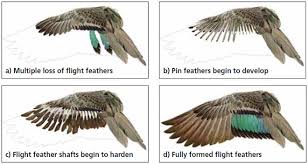moult
英 [məʊlt]
美 [moʊlt]
- vi. 脱毛;换毛;蜕皮
- vt. 脱毛;换毛
- n. 脱毛;换毛
- n. (Moult)人名;(英)莫尔特
使用频率:

中文词源
moult 蜕羽,换毛
来自mold的英式拼写形式。
英语词源
- moult
-
moult: [14] The etymological meaning of moult is simply ‘change’. It comes (via an assumed but never recorded Old English *mūtian) from a prehistoric Germanic verb borrowed from Latin mūtāre ‘change’ (source of English mutate). The extreme semantic narrowing down from ‘change’ to ‘change a coat of feathers’ is shown too in the related mews, which originally denoted ‘cages for moulting hawks’. The spelling with l, which started to appear in the 16th century, is due to association with words such as fault, whose l at that time was generally not pronounced. When it began to be, moult followed suit.
=> mews, mutate - moult
- see molt.
权威例句
- 1. Finches start to moult at around twelve weeks of age.
- 燕雀大约在12个星期大小的时候开始换羽毛。
